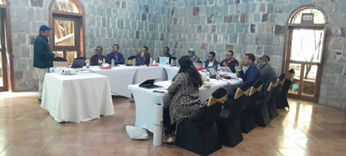
The world is under threats of emerging and re-emerging infectious diseases, food insecurity, and antimicrobial resistance among others that are now more apparent than ever. The need for an interconnected and interdisciplinary approach to education and research is more evident than ever. Traditional disciplinary methods are proving insufficient to address these multifaceted issues that impact humans, animals, and the environment.
Mirgissa Kaba, Associate professor at the Addis Ababa University is the focal point for the EU funded project COHESA, who states that a conventional disciplinary approach to education and research falls short in terms of problem-solving. One Health, on the other hand, offers competencies that experts from various sectors and disciplines can utilize to collaborate and collectively tackle shared challenges.
Addis Ababa University, is working to enhance collaboration and partnership between stakeholders in both the public and non-governmental sectors. However, the current education system remains compartmentalized, with limited space for One Health integration at secondary and university levels. Research activities in Ethiopia also largely remain within disciplinary boundaries with limited consideration of One Health.
To identify ways to incorporate One Health competencies into education and research, COHESA has conducted a net-mapping exercise, bringing together representatives from various sectors, universities, professional associations, media, NGOs, and research institutions. Following this exercise, multidisciplinary and multisectoral teams of experts were formed as Technical Working Groups on One Health education and research.

Seid Teku, Director of One Health Research Center, Professor at the School of Environment Jimma University emphasizes that the concepts of One Health have already found a place in some universities and suggests further consolidation. Alignment is sought in specific courses at the undergraduate and postgraduate levels for human, environmental, and veterinary education, as well as in field attachment programs. This approach is seen as vital to promoting collaboration across disciplines.
Birhanu Hadush, Associate professor atCollege of Veterinary Sciences, Mekelle University highlights the existing isolation and lack of collaboration in research efforts funded by universities and research institutions. Disciplines tend to work independently and don't contribute to solving common problems. The One Health approach aims to change this by encouraging multidisciplinary collaboration.
Additionally, COHESA is working on aligning One Health competencies in secondary schools' co-curricular activities as a pilot program. This effort is meant to link with universities that have already taken up the challenge of integrating One Health competencies. Yilkal Kebede, the General Manager of the Ethiopian Veterinary Association, notes that High school is where the future ambassadors and advocates of One Health will be developed.
Curriculum development experts from the Ministry of Education, Berhanu Tesfaye and Esubalew Wondimu, mention that although One Health may not be explicitly referenced, elements of One Health competencies are incorporated into the new curriculum and co-curriculum. They emphasize the potential for further connecting the dots to align with the spirit of One Health.
The journey to integrate One Health into education and research in Ethiopia is an ongoing, collaborative effort that emphasizes the urgency of addressing global challenges through multidisciplinary cooperation. In connection to the research and education, in the next year and beyond, the multiplier aims to achieve the following:
- Validate, share and promote the guideline developed to align OH principles into research and academic institutions' research profiles
- Monitor and report on how One Health principles are aligned in planning and execution of research by academic and research institutions
- Validate, share and promote OH module or have topics in specific masters and PhD courses and include an OH module or topic in specific courses in selected educational institutions.
- Establish OH clubs in selected high schools to improve OH awareness among students and their parents.
The integration of One Health into education and research has the potential to transform the way we address global health challenges.